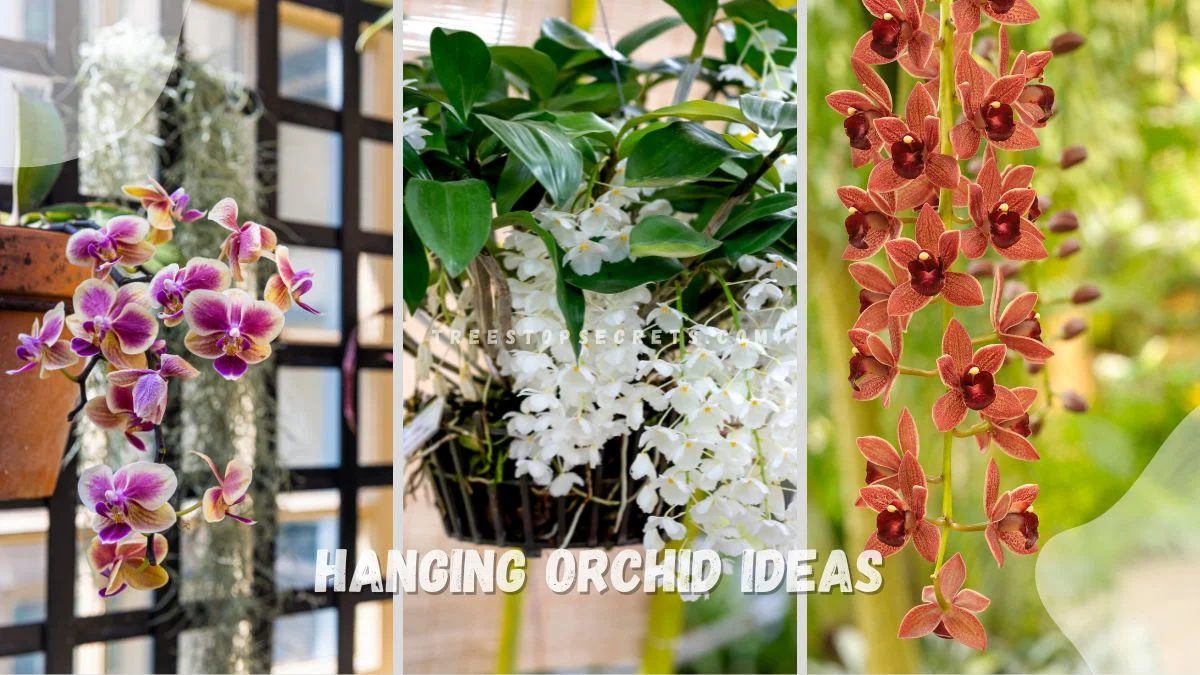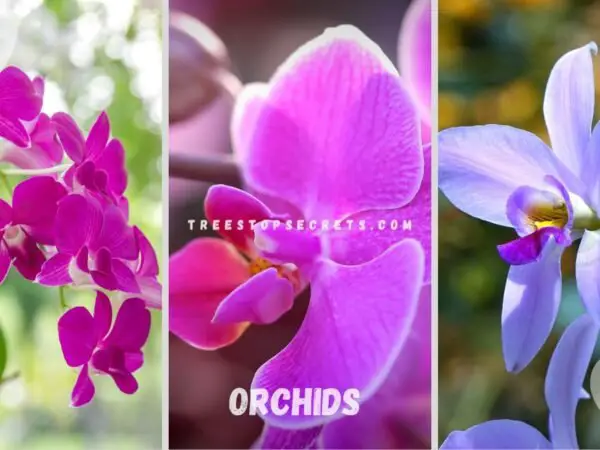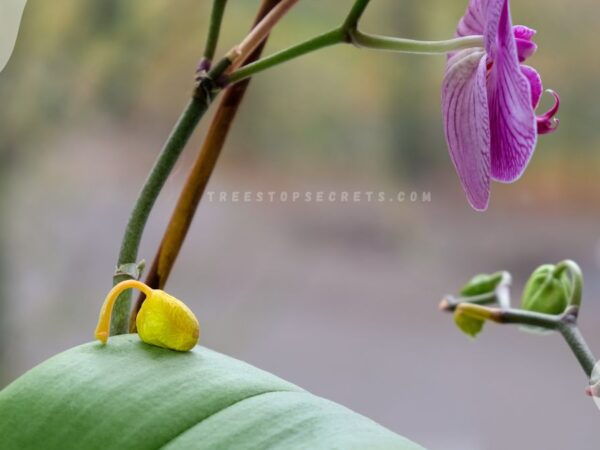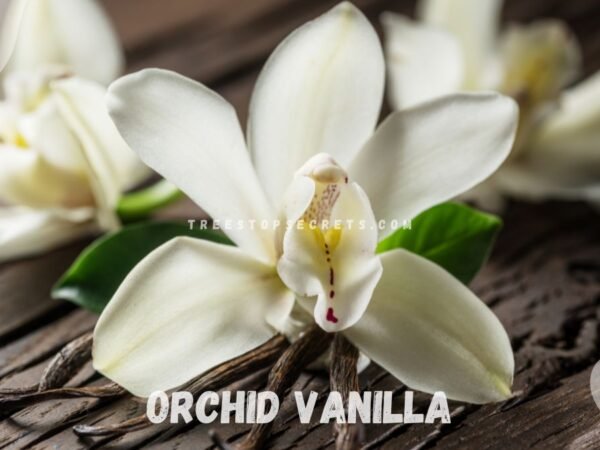Looking for fresh hanging orchid ideas to beautify your space? Whether you're a seasoned orchid enthusiast or just starting out, I can help you transform your home with these elegant plants. Hanging orchids can elevate any interior or exterior space, providing a stunning visual impact that captures the eye. From unique container suggestions to innovative display techniques, I have the knowledge to guide you in creating breathtaking orchid arrangements that fit your style and environment perfectly. Let's explore some exciting ways to showcase your orchids and enhance your surroundings with their natural beauty.
Hanging orchid ideas can vary widely, offering multiple creative ways to display these plants. For a modern look, you might consider using glass orbs or geometric planters, which highlight the orchids' roots and blooms. Traditionalists might prefer wooden or wire baskets filled with moss for a natural, rustic appeal. Another option is mounting orchids on pieces of driftwood or cork, which mimics their natural habitat and allows for easy watering. Each method has its advantages: glass orbs are stylish and space-saving, wooden baskets provide excellent drainage, and driftwood mounts enhance the orchids' natural growth patterns. Choosing the right option depends on your aesthetic preference and the specific needs of your orchids.
| Display Method | Description | Advantages |
|---|---|---|
| Glass Orbs | Modern, showcases roots | Stylish, space-saving |
| Wooden Baskets | Rustic, natural look | Good drainage, natural appearance |
| Driftwood Mounts | Mimics natural habitat | Enhances natural growth patterns |
There's so much more to discover about hanging orchid ideas, from DIY projects to professional tips. Ready to create your perfect orchid display? Let's dive into more exciting possibilities!
Key Takeaways
- Choose the Right Orchid: Select an orchid species that suits your environment and care abilities, considering factors like light and humidity.
- Opt for Suitable Containers: Pick containers with proper drainage holes to prevent waterlogging and ensure healthy root growth.
- Use Quality Potting Media: Select a well-draining mix like bark or sphagnum moss to provide good aeration and prevent root rot.
- Hang Orchids Properly: Utilize sturdy hooks or hangers in well-lit areas, ensuring they receive adequate light without direct sun exposure.
- Maintain Ideal Light and Environment: Place orchids in locations with indirect sunlight and consistent temperatures to promote blooming and growth.
- Water and Feed Carefully: Water orchids when the potting mix feels dry, and fertilize them regularly with a balanced orchid fertilizer to support healthy development of the plant.
Choosing Your Orchid
Select Right Variety
When choosing an orchid for a hanging basket, identify the suitable genus such as Phalaenopsis or Vanda. Consider the specific soil and container requirements for each type of orchid. Ensure that the orchid you select is epiphytic before placing it in a hanging basket.
- Suitable orchid genera: Phalaenopsis, Vanda
- Soil and container requirements vary per orchid type
- Epiphytic orchids are ideal for hanging baskets
Consider Growth Habits
To make the right choice, understand whether the orchid has monopodial or sympodial growth habits. Choose a container that aligns with the orchid's growth pattern. Differentiate between Cattleya, Dendrobium, and Phalaenopsis based on their growth habits.
- Orchid growth habits: monopodial or sympodial
- Container selection based on growth habits
- Differentiation between Cattleya, Dendrobium, and Phalaenopsis
Selecting Containers
Size Matters
When selecting a container for your hanging orchid, determine the appropriate size to promote healthy growth. Ensure the pot is not too large or small. Proper drainage is crucial, so choose a container with optimal dimensions. Consider the size of your orchid when selecting a hanging pot; it should have enough room to grow.
Container Types
Explore various container options suitable for your hanging orchids. Opt for containers that offer adequate air circulation and efficient drainage to prevent root rot. Choose between wooden baskets and other materials like plastic or terracotta based on your orchid's specific needs.
Potting Media Essentials
Choose Correct Media
Select the right potting media for epiphytic orchids in hanging pots. Consider the specific needs of orchids while choosing potting media. Ensure the media fosters healthy root growth and proper aeration.
When selecting potting media, opt for materials like sphagnum moss, bark chips, or perlite. These options provide optimal drainage and aeration for orchid roots. Avoid using regular soil as it can lead to root suffocation.
Media Benefits
Understanding the benefits of using appropriate potting media is crucial for hanging orchids. The right media supports orchid growth by providing essential nutrients and moisture. Proper media can also prevent common issues such as root rot, ensuring the plant's longevity.
Hanging Techniques
Secure Your Orchid
Implement methods to secure your orchid in the hanging pot. Use a sturdy wire to hang the basket securely. Ensure the orchid is stable and well-positioned within the container, avoiding any tilting or imbalance. To prevent accidents, make sure the orchid is firmly attached to the hook or bracket.
Prevent the orchid from shifting or falling out of the hanging basket by checking the back of the pot regularly. Adjust the wire if needed to maintain a secure hold. Securing your orchid properly not only enhances its appearance but also protects it from damage.
Ideal Placement
Determine the ideal location for hanging your orchid basket based on its specific requirements. Consider factors like light exposure and temperature when deciding on placement. Place the orchid in an area with sufficient light but avoid direct sunlight, which can scorch its leaves.
Ensure the orchid is placed in a spot that promotes healthy growth by maintaining adequate humidity levels. Avoid drafty areas that can cause temperature fluctuations, affecting the plant's health. By selecting the right location, you can ensure your orchid thrives and blooms beautifully.
Light and Environment
Find Ideal Light
To nurture hanging orchids successfully, it is crucial to grasp the optimal light conditions. Different orchid varieties have specific lighting requirements. Ensure they receive enough but indirect sunlight for growth.
Maintain Humidity
Mastering humidity levels is key for the well-being of hanging orchids. Implement strategies like using humidity trays or misting to elevate moisture levels around the orchid basket.
Watering and Nutrition
Watering Schedule
Establish a consistent watering schedule for your hanging orchid. This helps maintain plant health and avoid issues like root rot. Understand the watering needs of different orchid types, such as Phalaenopsis or Dendrobium, to provide adequate hydration. Remember, each orchid species may require varying watering frequencies based on factors like humidity levels and potting medium. Avoid overwatering by following a specific watering routine that suits your orchid's requirements.
Fertilize Properly
Know the correct fertilization practices for orchids in hanging pots to promote optimal growth. Select a balanced fertilizer with equal amounts of nitrogen, phosphorus, and potassium suitable for orchids. When applying fertilizer, be cautious not to directly contact the plant's roots to prevent burning. Understand the frequency and timing of fertilizing your orchid; generally, it is recommended to fertilize every two weeks during the growing season. Ensure you adjust fertilization during dormant periods to support healthy growth.
Special Tips
Water from Below
Watering orchids from below in hanging pots has several benefits. This method helps prevent issues like crown rot by avoiding water accumulation around the plant's leaves. Bottom watering also encourages healthy root development, leading to stronger and more resilient orchids.
To implement bottom watering, simply place your hanging orchid pot in a shallow container filled with water. Allow the plant to soak up the water through its drainage holes for a few minutes. This technique ensures that the roots receive adequate moisture without risking overwatering or fungal growth.
- Pros:
- Prevents crown rot
- Promotes healthy root growth
Humidity Tricks
Maintaining optimal humidity levels is crucial for the well-being of hanging orchids. One effective trick to increase humidity is by grouping plants together. This creates a microclimate where plants release moisture through transpiration, raising the overall humidity.
Another simple method to boost humidity around your orchid is by using a humidifier. This device releases fine mist into the air, creating a moist environment ideal for orchids. By incorporating these humidity tricks, you can ensure that your hanging orchid thrives in its preferred humid conditions.
- Cons:
- Requires additional equipment (humidifier)
- Risk of over-humidifying if not monitored properly
Final Remarks
You've now gained valuable insights into selecting the right orchid, choosing suitable containers, understanding potting media essentials, mastering hanging techniques, optimizing light and environmental conditions, watering effectively, and implementing special tips. By following these guidelines, you are well on your way to successfully caring for your hanging orchids. Remember to provide the necessary care and attention to ensure your orchids thrive in their hanging environment.
Now that you have all the tools and knowledge at your disposal, it's time to put them into practice. Take action today by applying what you've learned to create a beautiful and flourishing display of hanging orchids in your home or garden. Your dedication will be rewarded with stunning blooms and a sense of accomplishment in nurturing these delicate plants. Keep up the excellent work!
Frequently Asked Questions
How to Choose the Right Orchid for Hanging?
When selecting an orchid for hanging, consider these factors:
- Opt for epiphytic orchids like Phalaenopsis or Dendrobiums.
- Ensure the orchid has long, arching stems suitable for hanging baskets.
- Check if the orchid prefers bright, indirect light conditions.
How to Select the Ideal Container for Hanging Orchids?
Choose a container that:
- Has drainage holes to prevent waterlogging.
- Is lightweight yet sturdy enough to support the orchid.
- Allows airflow to the roots to prevent rot.
What Potting Media is Best for Hanging Orchids?
Ideal potting media includes:
- A mix of bark, sphagnum moss, and perlite for good drainage.
- Avoid heavy soils that retain too much moisture.
- Consider using a specialized orchid mix for epiphytic varieties.
What are Effective Hanging Techniques for Orchids?
To hang your orchid effectively:
- Use sturdy hooks or brackets rated for the weight of the plant.
- Ensure the hanging spot receives adequate light without direct sun exposure.
- Regularly rotate the orchid to promote even growth.
How Much Light and What Environment is Suitable for Hanging Orchids?
Hang your orchids in a location that:
- Receives bright, indirect light for 6-8 hours daily.
- Maintains consistent temperatures between 60-80°F (15-27°C).
- Provides humidity levels of 50-70% ideal for most orchids.
Image Source: Paid image from CANVA





